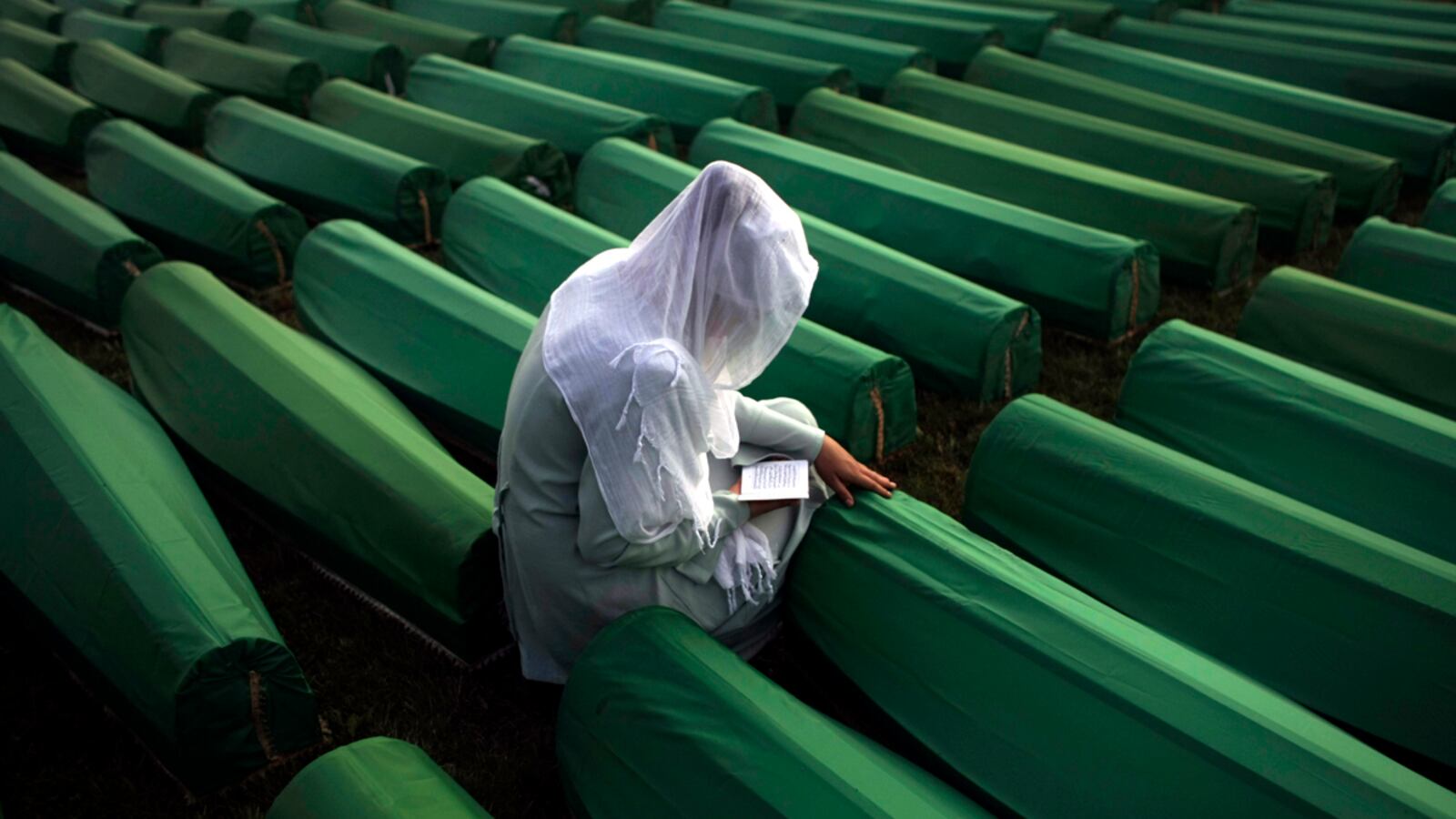Hours before the worst massacre in Europe since World War II, Serbian General Ratko Mladic met with the commander of the Dutch battalion that was supposed to protect Bosnian Muslims in a U.N.-declared “safe haven” around the town of Srebrenica. Mladic, whose troops had overrun the haven almost unopposed that morning of July 11, 1995, asked the Dutch commander, Lieutenant Colonel Thom Karremans, to drink a toast with him that evening. Karremans made excuses. His men couldn’t drink beer, so he wouldn’t, he said. Mladic came back at him again, and again. And Karremans raised a glass.
After almost 16 years, Mladic was captured on May 26 and taken to The Hague to face trial for crimes against humanity. Since then, even as families of the victims mark the anniversary of the atrocity, the videotape of that toast with Karremans has played repeatedly on Dutch television and on the Internet. For people in the Netherlands it is mesmerizing. For the rest of the world it should be, too. It’s not just that we know that thousands of people were about to be slaughtered by Mladic’s troops. It’s that Karremans’ behavior epitomizes the weakness and indecision in the face of tyranny that Europeans had hoped was long behind them.

Yes, there were extenuating circumstances. Yes, others higher up the United Nations chain of command were at fault as well. But Karremans looks so utterly lost, so utterly hapless as well as helpless, it is hard to associate him with the word “officer.” And it’s especially painful watching this now at a time when Libya and Afghanistan have shown just how thin on the ground European armies really are. (“France Doesn’t Have the Military Means to Match Its Political Ambitions,” headlined the French daily Le Monde on Tuesday afternoon.)
For the former members of the U.N. Dutchbat III, as Karremans’ unit was called, Srebrenica is never far away. Some manage to deal with PTSD quietly; some have committed suicide. One actually bought a house overlooking the Dutchbat compound at the town of Potocari in the former safe haven. But even those who prefer to forget have little chance now that Srebrenica is headline news again. And at last some of the Bosnian survivors of Srebrenica are getting a modicum of justice.
In a potentially groundbreaking legal precedent, the Dutch High Court ruled on July 5 of this year that the Netherlands is responsible for the death of specific Bosnians handed over to the Serbs.
It is quite possible that Karremans, during that first meeting on July 11, 1995, did not know what Mladic planned to do. But two days later, when Dutchbat was delivering the 5,000 refugees under its direct protection into the hands of the Serbs, it was clear that many people were being abused and slaughtered.
The stories from the survivors are truly harrowing. At the time of the massacre, Hasan Nuhanovic was working as an interpreter for Dutchbat when both his parents and his brother were sent out of the compound to their deaths. His father, Ibro, had even helped the Dutch by representing the refugees in negotiations with Mladic. By July 13, accounts were coming into the Dutchbat headquarters describing several bodies strewn along a stream just outside the compound. The buses with Bosnian men had been driven to the “white house,” only 300 to 400 meters from the compound. Everyone could hear the bursts of gunfire coming from inside the building.
Ibro Nuhanovic pleaded with the Dutch Major Robert Franken to let his younger son stay, but the Dutch officer insisted the 18-year-old and his mother go. Ibro joined them voluntarily, unwilling to see them go to their deaths without him. No one doubted what was coming. “Every dog knew it,” Hasan remembered. Hours later the father, the mother, and the younger son were all dead. Then Rizo Mustafic, a Dutchbat electrician, was denied the U.N. pass he had a right to, and was sent straight into his killers’ arms.
It’s not as if no one had seen this possibility. When Karremans raised a glass with Mladic for the first time, it must have triggered awkward memories of a training session back home in Holland. The Dutchbat unit that had served previously in Srebrenica had organized a role-playing session in the Netherlands in which Karremans participated. He was confronted with a Mladic-like character who wanted him to have a drink with him. Karremans took the drink—and failed the test. According to a participant in the exercise quoted by the Dutch newspaper Volkskrant in 2002, Karremans could not make decisions during the final part of the training: “It caused misunderstandings, and the military men did not know what to do. It was embarrassing.”
Sixteen years ago this week, the real Mladic spoke to Karremans in thinly veiled threats. “You have only one life, and I don’t believe you want to lose it here,” he says on the video. Karremans looks at Mladic from beneath his thick eyebrows. If a tall man can look small, Karremans appears tiny. “I am a piano player. Don’t shoot the piano player,” Karremans stammers later. “You are a lousy piano player,” Mladic barks back.
One could say the footage accurately portrays the chilling dynamics between the two officers, Karremans and Mladic. The degree of Karremans’ subservience might explain why Dutchbat was so compliant with the Serb commander’s demands. After evacuating the Dutch troops and rounding up the refugees, Dutchbat even helped the Serbs in dividing up the Bosnian people in two neat lines, one for the men, one for the women. But there was more to this obsequiousness than the weakness of one officer.
In statements taken from Dutchbat soldiers afterward, many described the buildup of a sense of loathing toward the refugees. There was hunger in the overcrowded compound as supplies had dried up; people were begging insistently, they were dirty and smelled bad. And then there was the overwhelming sense of powerlessness among the troops themselves. Many of the peacekeepers wanted to shed the responsibility of their charges. Did they know that the Bosnians were being slaughtered in the surrounding hills and that hundreds and then thousands of men expelled from the compound by Dutchbat would have to pay the ultimate price? The Dutch High court has decided they must have.
But what happens in the next war(s) where U.N. forces or so-called neutral armies are trying to keep—or enforce—a peace? When they grow tired, depressed, and treacherous? Many Afghans, many Libyans, and others may well want to know.






